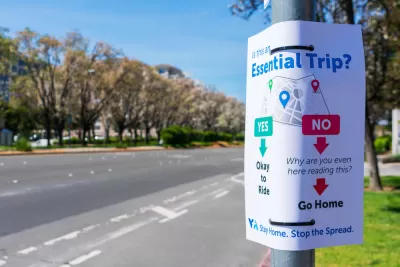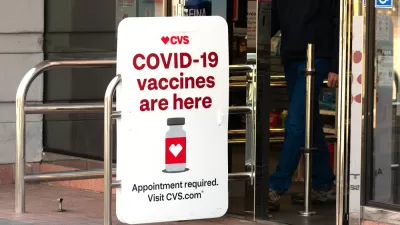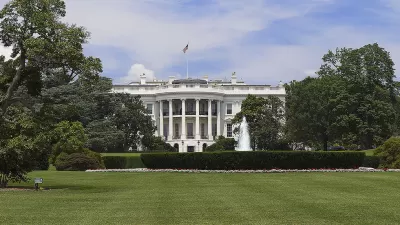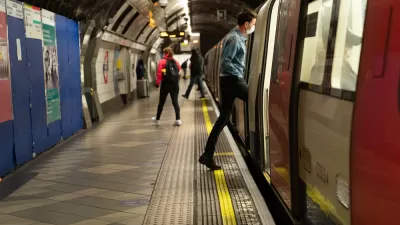It's official—the nation's leading public health agency would prefer that Americans drive alone to work to reduce exposure to the coronavirus. New CDC guidance call for government to subsidize drive-alone and single ride-share commutes.

The header of the New York Times article published on Friday dealt a body blow to transit agencies, stating that the Centers for Disease Control and Prevention (CDC) recommends, "Temperature checks, desk shields and no public transit..." in the age of the contagious novel coronavirus.
"The C.D.C. recommended that the isolation for employees should begin before they get to work — on their commute," writes . "In a stark change from public policy guidelines in the recent past, the agency said individuals should drive to work — alone."
Actually, their guidance, "COVID-19 Employer Information for Office Buildings," released May 27, does not say, "no public transit," but it's easy to see why the Times chose that wording. Their recommendations deal almost exclusively with the buildings themselves, with the exception of one bullet point under "Administrative controls: Change the way people work."
- For employees who commute to work using public transportation or ride sharing, consider offering the following support:
- Offer employees incentives to use forms of transportation that minimize close contact with others, such as offering reimbursement for parking for commuting to work alone or single-occupancy rides.
- Allow employees to shift their hours so they can commute during less busy times.
- Ask employees to wash their hands as soon as possible after their trip.
In short, the CDC is essentially telling workers to get in their own motor vehicle, drive to work, preferably during off-peak hours, and remember to wash their hands before and after their driving commute.
As for ride-sharing alternatives, the Washington Post even ruled out that option in their write-up of the new guidance:
"The CDC recommendations say workers should be encouraged to drive alone rather than sharing rides or taking public transportation," wrote and
CDC guidance for mass transit
Also on the CDC website is a "Mass Transit Decision Tool" directed to public transit agencies:
Mass transit is critical for many Americans to commute to/from work and to access essential goods and services. Mass transit may need to remain open and certain routes prioritized. Follow these guidelines for bus transit operators, rail transit operators, transit maintenance workers, and transit station workers.
Among the recommendations:
- Encourage social distancing by increasing spacing of passengers and employees, closing every other row of seats and using bus rear door entry/exit, if feasible
As for public transit within the office building, i.e., elevators, their recommendation is consistent: "Limit use and occupancy of elevators to maintain social distancing of at least 6 feet."
Related in Planetizen:
-
Elevators Are Not the Villain, May 11, 2020
-
White House Shelves Reopening Guidelines Prepared by CDC, May 10, 2020
-
Subway-Coronavirus Connection Suffers From Lack of Evidence, April 20, 2020
Hot tip to Kenyon Karl.
FULL STORY: C.D.C. Recommends Sweeping Changes to American Offices

Alabama: Trump Terminates Settlements for Black Communities Harmed By Raw Sewage
Trump deemed the landmark civil rights agreement “illegal DEI and environmental justice policy.”

Study: Maui’s Plan to Convert Vacation Rentals to Long-Term Housing Could Cause Nearly $1 Billion Economic Loss
The plan would reduce visitor accommodation by 25% resulting in 1,900 jobs lost.

Planetizen Federal Action Tracker
A weekly monitor of how Trump’s orders and actions are impacting planners and planning in America.

Waymo Gets Permission to Map SF’s Market Street
If allowed to operate on the traffic-restricted street, Waymo’s autonomous taxis would have a leg up over ride-hailing competitors — and counter the city’s efforts to grow bike and pedestrian on the thoroughfare.

Parklet Symposium Highlights the Success of Shared Spaces
Parklets got a boost during the Covid-19 pandemic, when the concept was translated to outdoor dining programs that offered restaurants a lifeline during the shutdown.

Federal Homelessness Agency Places Entire Staff on Leave
The U.S. Interagency Council on Homelessness is the only federal agency dedicated to preventing and ending homelessness.
Urban Design for Planners 1: Software Tools
This six-course series explores essential urban design concepts using open source software and equips planners with the tools they need to participate fully in the urban design process.
Planning for Universal Design
Learn the tools for implementing Universal Design in planning regulations.
Caltrans
Smith Gee Studio
Institute for Housing and Urban Development Studies (IHS)
City of Grandview
Harvard GSD Executive Education
Toledo-Lucas County Plan Commissions
Salt Lake City
NYU Wagner Graduate School of Public Service





























